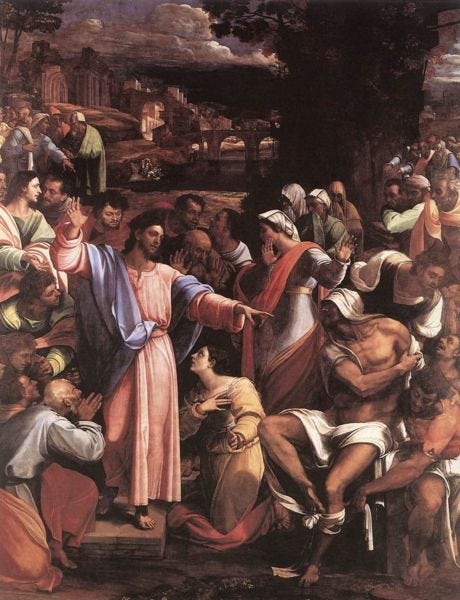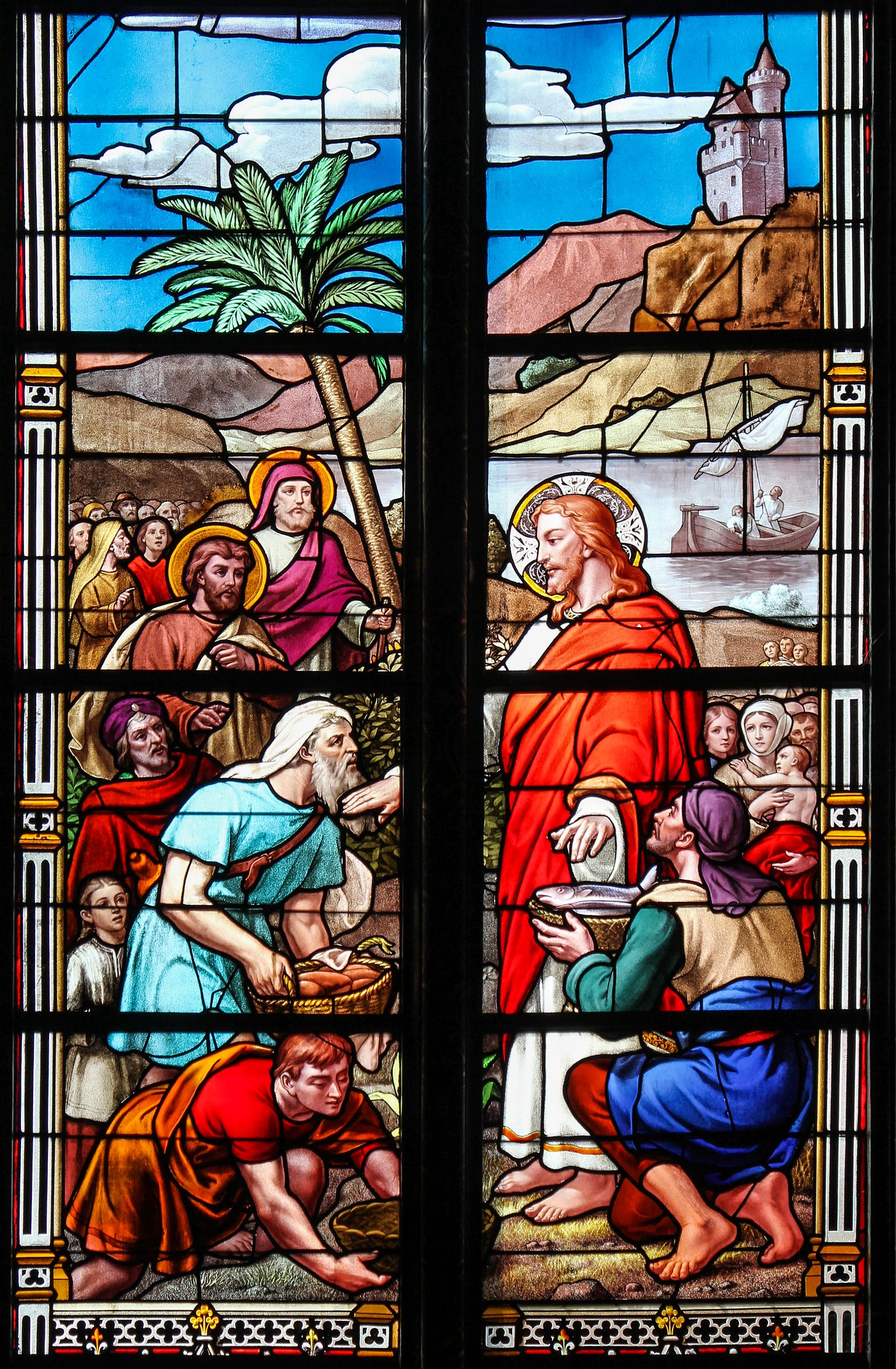I just found this article lying around, in draft form, and not quite complete. I really like it, so I finished up the missing parts as best as I could, so I could share it with you.
For some reason or another, I was recently watching a John Hamer lecture on The Historical Jesus, published January 11, 2022, for a second time. After the formal lecture, in the question and answer period, John asked a few questions of the audience. The one that caught my attention reads like this on his slide:
Even if history could prove that Jesus performed a supernatural physical miracle, what would that prove?
That’s an interesting question! Whether or not Jesus actually performed miracles always seemed a very important question to me, and since my childhood I’ve spent a lot of time trying to figure out which of Jesus’s purported miracles were possibly real, how they might have been faked, and how the laws of the universe might allow or disallow for them.
Pastor Hamer, however, doesn’t think this line of thinking is very important. He argues that paranormal events on the planet Earth are simply not relevant from a theological standpoint, since the incredibly vast scope of God’s creation is so much broader than that. If one person had amazing magical powers, this would not constitute proof in God, or that that person was God. Connecting with God, he argues, requires deep philosophical and theological introspection, to which supernatural occurrences are not relevant.
I can totally see where Hamer is coming from, but it seems to me that he is making an assumption about the nature of these miracles. If we can explain or account for a miraculous phenomenon without having to make adjustments to our fundamental understanding of reality, existence, and the nature of being, we might refer to this miracle as metaphysically coherent. On the other hand, if the miracle challenges our fundamental understanding of reality, we might refer to it as metaphysically anomalous. If we find ourselves having to rethink our metaphysics, this would certainly affect the nature of our philosophical and theological introspection that Hamer argues is required in order to connect with God. This leads me to think that he is assuming the miracles to be metaphysically coherent.
To ground this in specific examples, Hamer mentions two miracles that we might consider: Jesus walking on water, and Jesus raising Lazarus from the dead. Hamer fully admits that either of these miracles would have significant practical and scientific implications. And yet, we can easily imagine explanations for both of these that would present no significant metaphysical impact.

For example, if Jesus possessed the ability to manipulate energy fields at a fundamental level, he might have been able to alter the molecular structure of the water's surface. By enhancing the cohesion between water molecules in a localized area, he could increase the surface tension enough to support his weight.

Resurrection of the dead is an impossibility from the point of view of modern science, and our scientific understanding of the world would be greatly upset if we had evidence of this occurrence. And yet, this is not something that would require us to completely rethink our worldview. Suppose we not only had evidence of a person bring people back from the dead, but we had a living person that could do so who was willing to subject themselves to scientific study. Scientists might discover that the miracle worker was able to transmit large amounts of anime, or life energy, into the dead body, and direct that energy to do things like restart the heart and breathing cycles, and accelerate repair of cells that have been badly damaged by lack of oxygen. Modern science does not recognize any such anime, but in the face of the new evidence, new scientific theories would appear that would incorporate that evidence.
Perhaps the adjustments and upheavals in our scientific theories to account for this new data would be immense. But they would not necessarily raise a challenge to the prevailing understanding of the nature of reality. We would have no trouble going on believing that we live in a universe governed by precise mathematical laws; that things are either true or they are not; and that we can only know if something is true if there is overwhelming empirical evidence to support it. Phenomena that appear to be supernatural are, if not hoaxes, simply not well enough understood, and with better understanding and research, they would yield to scientific explanation. Everything that exists is still ultimately reducible to physical entities and processes.

I would like to consider a miracle attributed to Jesus that, if real, would not be so gentle on our prevailing metaphysical understandings. I’ve written about the story of loaves and fishes before: Jesus feeds a large crowd of people with only a few loaves of bread and a handful of fishes. The numbers vary from account to account, but in Matthew 6:30-44, Jesus feeds five thousand men1 with five loaves and two fish. Not only did everyone eat their fill, but there was more left over than what he started with!
One explanation for this is that when Jesus shared the food, it encouraged other people in the crowd to share all the food that they had with them as well, and everyone donated so generously that there was more than enough. This is probably not what the tellers of the story wanted us to think, because if it was, they would have mentioned it. The tellers of this story want us to think that a real miracle happened.
One thing that always struck me about the fishes and loaves story is the lack of mechanism for this miracle. What if we studied this one scientifically as well? And, the story is not about people suddenly feeling more generous than before, but rather, that there was an actual increase in the amount food. Did it just magically appear from somewhere? Did the loaves grow, and split, multiplying themselves? Where did the extra material come from? Things magically appearing out of thin air is a common enough thing in fairy tails, but we really don’t expect it in real life, because it is just so weird. It is metaphysically anomalous.
If we have evidence that the loaves and fishes story actually happened, this would tell us that in some essential way, the universe is not simply ruled by the laws of physics, but also by the laws of myth. This would force us to make adjustments to our fundamental understanding of reality, existence, and the nature of being. This would be a big deal. And it would be a good thing. Because the world is actually shaped by our myths, and not just indirectly due to the effect that our myths have on our psyche (spirit).
In another lecture, (Which Sayings of Jesus are Authentic?), Pastor John tells us:
This is actually why I’m suggesting that all of this should actually be an academic historical exercise and not a theological religious one. By that I mean, what’s important really to Christianity is not the historical Jesus, it’s the Jesus Christ of scripture anyway.
My instinct tells me that the historical Jesus is really important. We tell stories because of the way they juxtapose the real world. The creative act of telling stories starts with what we know to be so, and moves on from there. If it turned out that the historical Jesus was a charlatan, and just in it for the money and fame, that wouldn’t change anything? Would we still be Christians? I wouldn’t.
In the question and answer section of this talk, John speaks of the historical versus the true (this is my transcription, and I might have edited somewhat to make it read more like written English, and less like spoken):
Mark Beak: “Can you speak to the idea that if Christianity is not true, our faith is in vane?”
So I think that we’ve had in the modern era, which is to say, the 1700’s onward, we have had an increasing awareness of history and historicity; we have developed the academic discipline of history to actually discover what happened and what didn’t happen; and we have had what I think is a very false equivalence that things which are historical are true. So we just innately say that, we say that George Washington chopped down the cherry tree, when we find out that’s not a well attested event, and that historians don’t think that it happened, then we say that’s not true. As if history is truth. So when we’re talking about if Christianity is not true, our faith is in vain, “true” here, we should not be having this modern idea that true means history. It’s not history. Although we have in modern times equated truth and history, history is not true. History is what happened, and actual history, accessible history, is our best ability to reconstruct the most likely sequence of what happened based on our reading of the available sources and other evidence. And so it is in fact a dim reconstruction. It’s not truth. It’s something that informs us about other things. It can give us historical context. It allows us to read historical texts. If we don’t have the historical context of the text, then we will read it using presentism and we get all sorts of distorted understandings of that text. So history is very valuable, but history isn’t true. And so, I would say, Christianity is not history. Christianity is an idea about how Christians have organized into sacred community in order to relate to one another and to God. And so that experience can be true, and that’s not about a history, and not being true, and then it’s not in vain.
What John is saying here is really important, and I am very agreeable to his line of thinking. But he seems to rule out the possibility that history and our stories are more intertwined, so that the latter might influence the former. Perhaps our myths, our stories, our scripture, our psyches, actually create our history. But that is way too cause and effect for me. In Chinese philosophy, they do not make such a big deal as Westerners do about cause and effect. It’s more of a mutual affair, where our myths influence our history, and our history influences our myths. This means, I would argue, that we are in co-creation with God, and that clearly has drastic theological implications.
It’s not clear to me here if five thousand is the size of the entire crowd, or if that’s just a count of the males in the crowd, extrapolating to a group of more than ten thousand people.




A deeply thought-provoking post, John. Thank you.
I have no problem believing that it is possible to walk on water, or walk through walls for that matter. I have had enough supernatural experiences to know that what you say is true: the supernatural is “simply not well enough understood.” In my little brain, “metaphysically anomalous” equals a learning opportunity, a line of enquiry.
I think much of our scientific understanding is simply wrong. It took a wrong turning when the Michelson–Morley experiment to detect the ether failed in 1887. I think Einstein also helped lead us down the garden path to a dead end, in which we are now largely stuck.
Edgar Cayce, The Sleeping Prophet (1877-1945) told us that the Atlanteans had technology that could do all sorts of things, including fly through mountains. Today, there are consistent reports of anomalous physics associated with UFOs all over the planet.
So, to me, it seems logical that there is a higher knowledge to which we are not generally privy.
As an enlightened being, Jesus I would imagine had access to this knowledge.
Which brings us to history, which - in the opinion of many - is a pack of lies written by the winners.
In this context, and for the last 2000 years, the winners would usually be the Romans. Some, like Joseph Atwill, say that the Jesus of the New Testament - and indeed the New Testament itself - is a literary invention of the Romans, specifically, the Flavian family/dynasty, created to suit the political exigencies of The Empire.
If they are a literary invention, how much of them are based on the historical, Gnostic, Jesus of the Essenes, whose existence and followers the Romans went to genocidal lengths to expunge from the record for more than a millennium?
Have two Jesus characters (one historical, one literary) been conflated into one by the narrative painters, as they did with the Kings Arthur (and others), for example?
This is a question I am keen to explore.
By the way, that image of Christ feeding the multitudes is stunning!
Drop the “super”
Pick up the ordinary
Let go